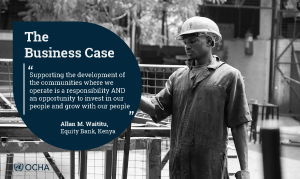L’engagement des entreprises privées dans l’action humanitaire
Publié le 29.11.2017
Philanthropy Advisors, Vantage Partners et le Bureau de la Coordination Humanitaire (OCHA) ont dévoilé le 28 novembre une étude de cas sur l'engagement des entreprises privées dans l'action humanitaire.
L’étude “The Business Case : a study of private sector engagement in humanitarian action”, réalisée par Philanthropy Advisors en partenariat avec OCHA et Vantage Partners, a pour objectif de mobiliser des chefs d’entreprises à participer à des partenariats publics-privés. Initialement prévue pour le secteur privé, cette étude permet également aux associations et fondations de mieux comprendre le fonctionnement du secteur privé et leurs attentes pour mettre en place des partenariats.
In recent years, humanitarian partnerships involving private sector companies are on the rise, with initiatives emerging in the mega-typhoon Haiyan in the Philippines, the earthquake in Haiti, the conflicts in Syria and Yemen and the Ebola outbreak in West Africa. These partnerships have been forged around different areas, including communications technology, logistics, health, education, shelter, water, sanitation and hygiene (WASH), cash transfers, leadership training and the provision of technical support in crises.
- Based on extensive surveys and more than 50 interviews with business representatives, the study looks at why and how the private sector engages in humanitarian action, unpacking the “business case” for collaboration between private companies and humanitarian organizations.
- While corporate social responsibility is “first and foremost the opportunity to help the most vulnerable communities to become more resilient,”as one survey respondent said – a significant 70 per cent of respondents added that the expected return on investment was a crucial factor in deciding whether to pursue a partnership.
The study identifies four concrete drivers of private sector engagement in humanitarian action:
- To develop commercial opportunities by accessing and testing new markets.
- To reduce business risk and mitigate loss by protecting their employees as well as the consumer base.
- To build relationships with other businesses, international organizations and governments.
- To enhance business assets such as the company’s reputation or staff skills and motivation: “By engaging in humanitarian action, companies can test and evaluate internal standard operating procedures and instruments and have the chance to train employees under extreme circumstances,” one respondent explained.
The study also looked at four concrete models of engagement that can add concrete value for businesses in a partnership:
- Businesses with products or services relevant to a humanitarian response interested in developing their business assets, innovation or accessing new markets.
- Businesses operating in areas potentially affected by humanitarian crises protecting their staff, infrastructures, and customers before, during and after humanitarian crises.
- Businesses providing pro bono products or services to improve the internal operations of humanitarian organizations or the humanitarian system as a whole.
- Businesses, their staff and their customers, making financial contributions in an effective and impactful way through aid organizations or directly to affected people.
The study concludes: “Creating smart and strategic partnerships with businesses can help encourage principled action and help humanitarian organizations achieve greater impact than by simply raising funds from companies. Adopting a long-term and sustainable approach to partnerships… is also more likely to improve their own humanitarian emergency preparedness and response delivery.”
Plus d’infos sur Philanthropy Advisors


